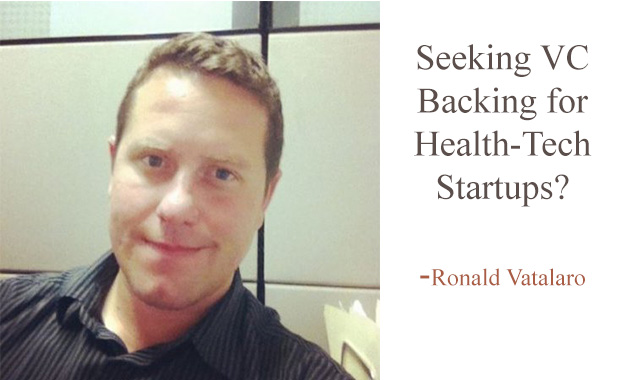Exclusive article by Ronald Vatalaro at EMRIndustry.com
Seeking VC Backing for Health-Tech Startups? Here are some Tips:
Interest in digital health tech startups is rising. A record-breaking $4 billion dollars in venture funding was secured for startups in 2014, according to Mercom Capital Group.
Despite their success, tech startups aren’t always portrayed as the most professional business ventures. Visions of daily “casual Friday” attire, rooms set aside for midday naps and images of reoccurring pingpong tournaments cloud some investors’ perception of tech startups.
However, the casual atmosphere helps promote and encourage innovation, establishing an environment in which ideas flow freely. It’s crucial to the success of many tech startups as they focus on building their own brand, while keeping their own culture intact.
Relaxed work environment aside, many startups can make viable contributions to the healthcare information technology industry. Entrepreneurs just need to keep a few things in mind:
Tips for hopeful tech startups
- · Doctors are a hospital’s most costly resource. They have many tasks, but only a limited amount of time, so tech startups offering efficient ways to delegate work and streamline processes are in high demand.
- · Functionality is the name of the game for tech startups. Overly complicated initiatives won’t do well, especially if they create additional workflow issues.
- · In years past, providers received payment for their services, but now, insurance companies reward providers on measures more focused on the quality of a patient’s experience and efficiency. This increases the demand for apps focusing on patient experience and satisfaction.
Relationship building with patients
Deductibles are increasing, putting more responsibility on patients to pay for their visits. Since people are paying more out of pocket, they’ve become more selective when it comes to the physicians they see. Patient involvement is paramount so tech startup entrepreneurs should consider apps promoting evaluation. This way, physicians know where they succeed and need to improve, while patients have the opportunity to compare and contrast the experts in their area.
Knowing your client
Meeting with and speaking directly with potential clients is imperative for startups. Ideally entrepreneurs are looking to spend the least amount of resources possible to the maximum number of potential clients when demonstrating a prototype. Conversations with target clients should be candid. Entrepreneurs should seek their feedback and opinions on the prototype. Speak to Physicians to get a feel for how they interact with their electronic medical records systems (EMRs), and where the deficiencies are.
Knowing your client is important, but it isn’t enough. Startup hopefuls need to tell a compelling story about their product and how their business model addresses the needs of healthcare providers. Customer validation is key since past results are what motivate future investments. A strong presentation and a robust financial model are critical to explaining where a startup should go as it develops.
Lean startup initiatives
The lean startup model favors experimentation and customer input/feedback over complex theoretical planning. Instead of spending months planning and researching, entrepreneurs understand that all they have is a series of good guesses. Instead of composing an intricate business plan based on guesses, founders summarize their predictions in a business model canvas.
Developers go out, find and ask potential users for feedback on all elements of their proposed business model. Then they use that insight to revamp the product quickly, addressing areas of concern.
Finally, developers implement an agile system. Agile, which shares many features and is complementary with the lean startup model, eliminates wasted time and resources by developing the product repeatedly and in increments. They can combine the customer feedback into these revisions and ultimately have a more polished product to present to investors.
Author:
Ron Vatalaro works at Bisk Education with USF Health Morsani College of Medicine at the University of South Florida and writes about health informatics. Ron holds an advanced degree in Business Administration with a concentration in technology.



























